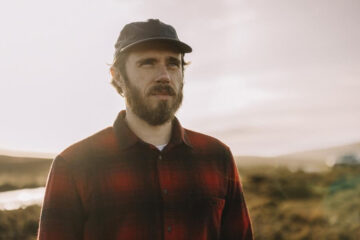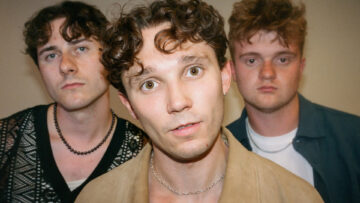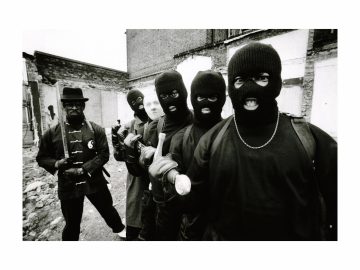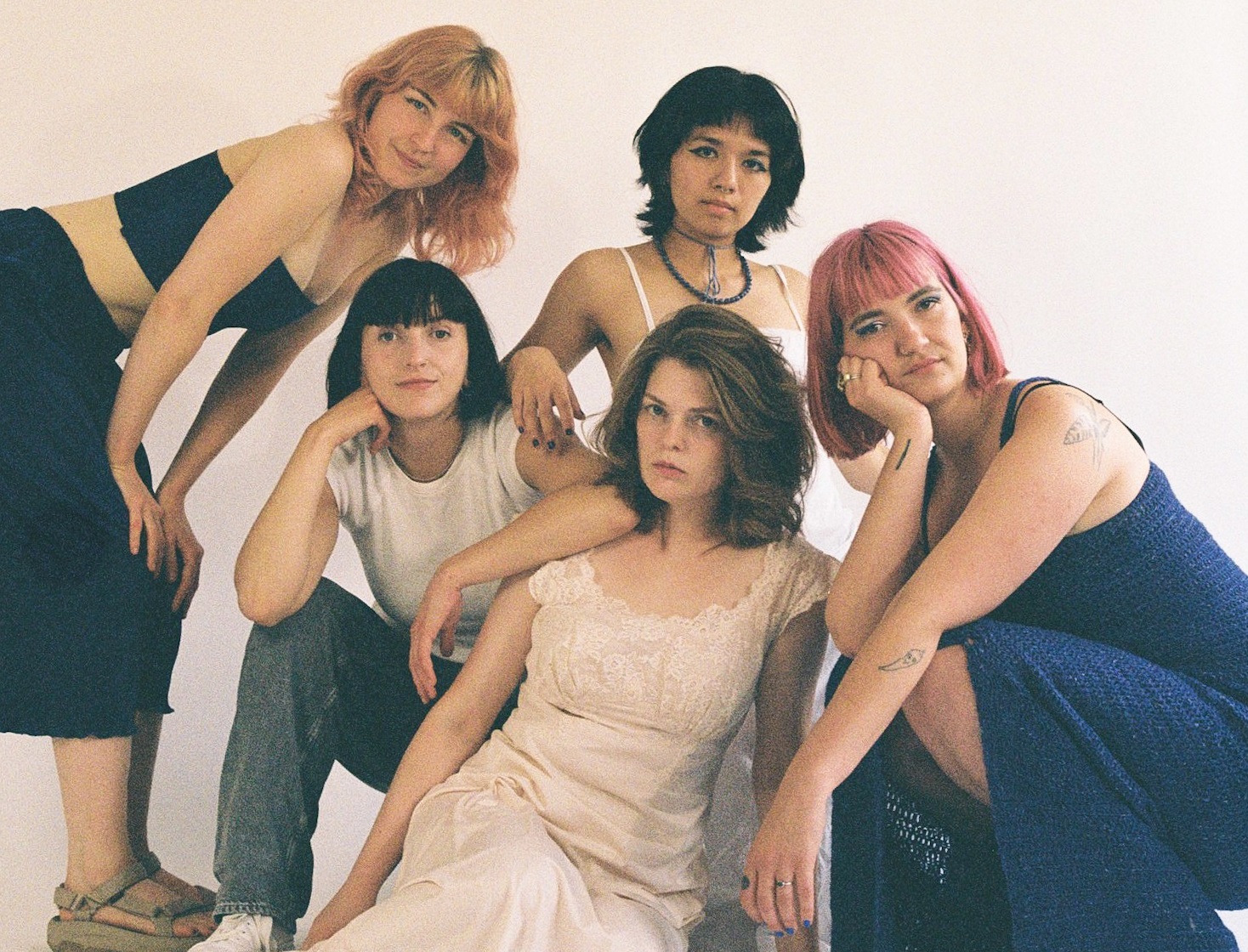
The Klittens have emerged from the Amsterdam underground scene as a formidable force in alternative music. Founders Yaël Dekker and Winnie Conradi initially came together not with the intention of starting a band, but to find a platform for their fervent political ideas.
The result was an explosive blend of feminist punk music that has since captivated audiences across Europe. Yaël, the band’s impassioned vocalist, and Winnie, Klittens’ insightful guitarist, here sit down with us to discuss their journey from political activists to musical innovators. In this candid interview, they weigh in on the evolution of their sound, the smoothly-engineered democratic process that helps band front a truly co-operative sound, and how personal growth has influenced their artistry.
From their beginnings, including a tiny gig in Carlisle which they now consider their second home, to touring with high-profile acts like Otoboke Beaver, The Klittens have not only expanded their musical repertoire but also refined their signature mix of pop fuzz and post-punk darkness.
Here’s what the duo had to share about their creative process, tour life, and the unexpected places that inspire their music.
Interview with Yaël Dekker and Winnie Conradi of The Klittens
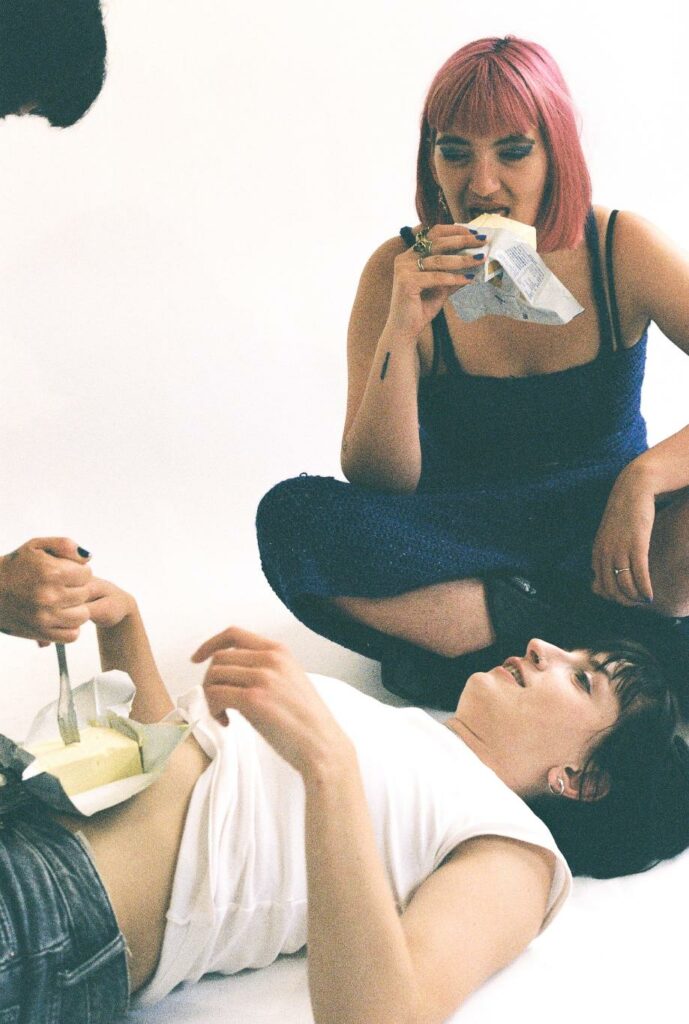
whynow: What’s The Klittens’ origin story?
Winnie: Yaël and I studied together in Amsterdam, but the band didn’t actually start with the idea of making music. We were looking for a platform for our political ideas – which is very broad! – and very quickly came to the realisation that the best way to do that was with a band via feminist punk music. Musically, we were all at a similar level. Everyone had some experience playing as a hobby, singing cover tracks and practicing chords, but none of us had ever really written a song before. It was a good starting point that everyone was really new in this field. Luckily, it started a very creative process!
whynow: It’s interesting that you began as a political force that developed into a musical group. The nature of politics is that it’s often very divisive, are you all in total agreement about your views – and this isn’t me trying to find any conflicts! – but does it help that there’s unanimous agreement on all of your beliefs?
Yaël: Interesting question, actually. I think it’s a two-part answer. On the one hand, we’re very democratic, insanely so! We vote on everything and have internal surveys, so we’re very attuned to what the other people want. We’re also not all on the other side of the spectrum, but there’s a definite difference in the urgency with which we want to speak up.
whynow: Winnie, you’ve mentioned previously that you recorded the initial version of ‘Reading Material’ in Garage Band. How does this DIY approach influence the rest of the music? Do you find it’s more authentic that way as opposed to being professionally produced?
Winnie: I was looking for a way to stimulate a creative process within myself. Often, I find that when I’m just playing around with my guitar, I can get in tune with it, but I find it pretty difficult to start writing a song out of the blue with my guitar. But in Garage Band – or Logic, which is what I use now – you have an overview of all these instruments and different sounds, specific sounds, that can really trigger inspiration. This means I get a much clearer vision of what direction I want to go within a song.
whynow: What are your influences in and outside of music?
Yaël: I always find this a difficult question because we’re five people. I tend not to reference songs when we’re creating. We don’t like that too much, but right now, I’m listening to The Prodigy a lot, and Winnie’s listening to a lot of jazz. Outside of music, all of us are interested in fashion. Not so much the branded side, of course, but more making clothes ourselves. Most of us knit, sew and embroider. With films, we’re all very much into the Nouvelle Vague period, and I like animation a lot, mostly hand-drawn (we all draw and paint).
I also like to write poetry, before the band started I was really into spoken word, but I can’t imagine going back to that now. For a while, Winnie and I both did cultural heritage and went in a direction that was about encouraging the development of the cultural field in relation to racism. During that period, I got very interested in James Baldwin and Zora Neale Hurston.
Winnie: On the topic of movies, it’s true that we aren’t really huge fans of specific directors or movies, but when we’re writing a song, I can often imagine a movie as a part of it. You know, when we started writing Badlands, we realised there’s a movie called Badlands that fits with that, and when we were writing ‘Atlas’, which Katja wrote, I could see it as a Medieval-themed movie. So, for me, being able to imagine a world that fits with a song shapes the songwriting process, but it usually comes after the fact.
whynow: You’ve been together for six years, which is quite a long time. You must have grown so much as people during that period. How has that growth affected your band and changed the way you work?
Winnie: I came to the realisation during a different interview that when we’d just started the band, and of course none of us had any experience in songwriting, we would just jam and then whenever what ‘felt’ like a song would become a song. Now, what we excel in is making lots of snippets of songs or even writing several minutes of songs and then going into the song together and begin composing, really breaking it down and seeing what bars are strong, what we can switch around, and what can be emphasised more. I feel like we’ve definitely developed that composing strength.
whynow: Whilst on tour, how do you maintain your energy and camaraderie together, making sure everyone’s handling it well and feeling right?
Winnie: I do mean this: we are all very sweet and careful people, very mindful of each other’s emotional state. It’s also something that we’ve learned, so we all accept when someone needs space. We all have these sorts of antennas to recognise when someone needs some alone time, or if I’m being too much, I’ll go off and do something by myself.
Yaël: I feel very safe during tour, safe to be cranky! Some of us need a bit more sleep in between and things like that, but it’s my favorite thing to do in life! It can also feel very real, like a weekend on the road can pass and it feels like a month. I do get quite existential when we’re on the road, but in a good way, and I feel really safe with the others when I feel like that.
READ MORE: Deep Tan: ‘The Xenomorph is sexy. She’s shiny like latex’
whynow: Talking of touring, what are some of the most memorable moments that have encapsulated the spirit of Klittens for you?
Yaël: [To Winnie] Should we do Carlisle? I’ll tell him about Carlisle. We went on tour pretty early in the process, basically when most bands wouldn’t have gone on tour, but we’re friends with a band called Bull, and they arranged it for us, so we went. On that tour, our first in the UK, we’d basically decided: We’re going to take this so seriously. You’ll see us coming. So anyway, we went to Carlisle and played in the Warwick Bazaar, this tiny rectangular building. We didn’t have that many songs at that point, but it was so good. It was sweaty, it was super absurd, but it was lovely. We had an amazing time, and since then, we’ve had a special bond with Carlisle. They even wrote about us in the local paper.
Winnie: Other people are so confused when we say we love Carlisle. They’re like, “Erm, why?!”
Yaël: It’s just such a cool place and weird in a very good way.
whynow: What’s the connection with your fans like and the way it shapes your performances?
Winnie: Apart from having a very clear image of Carlisle, we have an overview of what our fanbase looks like. It’s quite diverse and when I look into the crowds I don’t often see the same faces, we have lots of new people at our shows.
Yaël: When we were in the UK we did experience people coming up to us afterwards and saying, “Hey we were at your last show,” but they aren’t pushy about it, they’re always very nice.
Winnie: Interaction in the Netherlands is a bit difficult. When we finish a show in the UK, we go to the merch booth or just have a drink, and people come up to us and have a little chat. But in the Netherlands, it’s more of a formula for the way we are with the audience. And maybe they’ll buy a shirt but they won’t hang around too much to talk about it. They’re more distant.
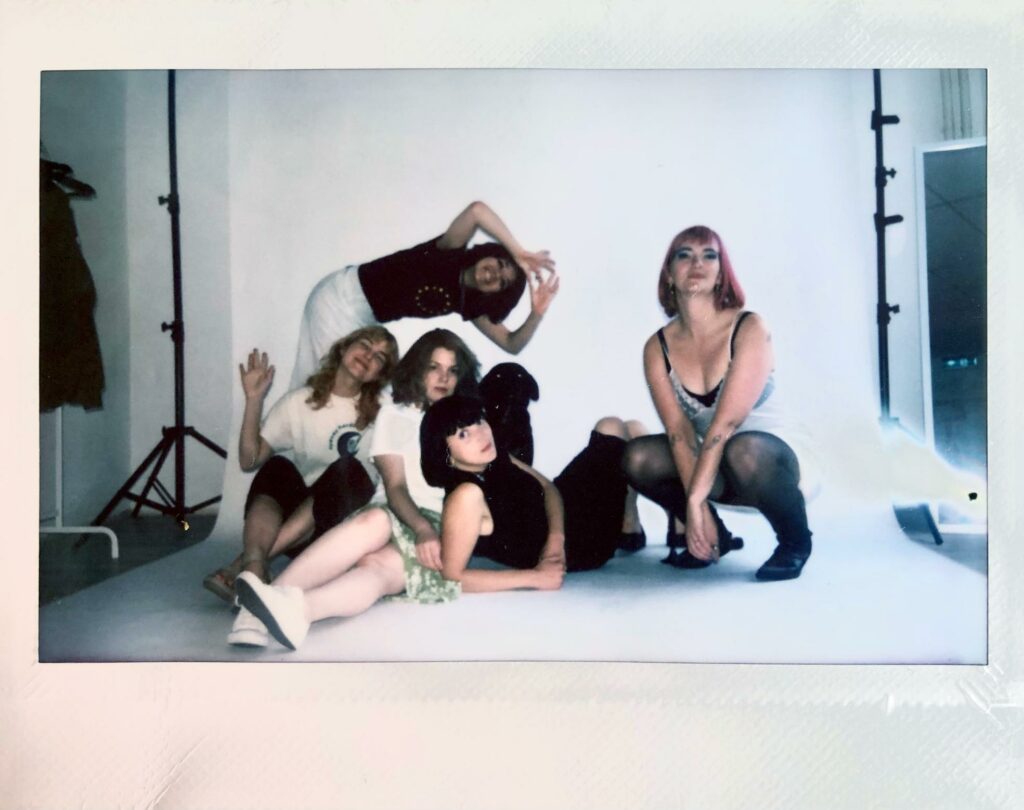
whynow: That’s very interesting. Do you think it’s indicative of a deeper cultural difference between the Brits and the Dutch?
Yaël: You’re more jolly! Dutch people often say, ‘Oh don’t fall for it, Brits are only jolly on the outside!’ But for us, we’re treated very warmly. And obviously, it doesn’t count for much but when the cashier calls you ‘love’ it’s very nice!
Winnie: I discuss this a lot with friends who aren’t from the Netherlands. I was just talking to a Spanish friend today and he said that when he was staying here the other week, he always forgets how nice it is that Spanish people talk to you a lot and kiss you on the face, but in the Netherlands people barely make physical contact.
The good thing about the Netherlands is that you feel like you can wear anything and express yourself in any way and that people might judge you but never say it out loud.
Keep up to date with the best in UK music by following us on Instagram: @whynowworld and on Twitter/X: @whynowworld


